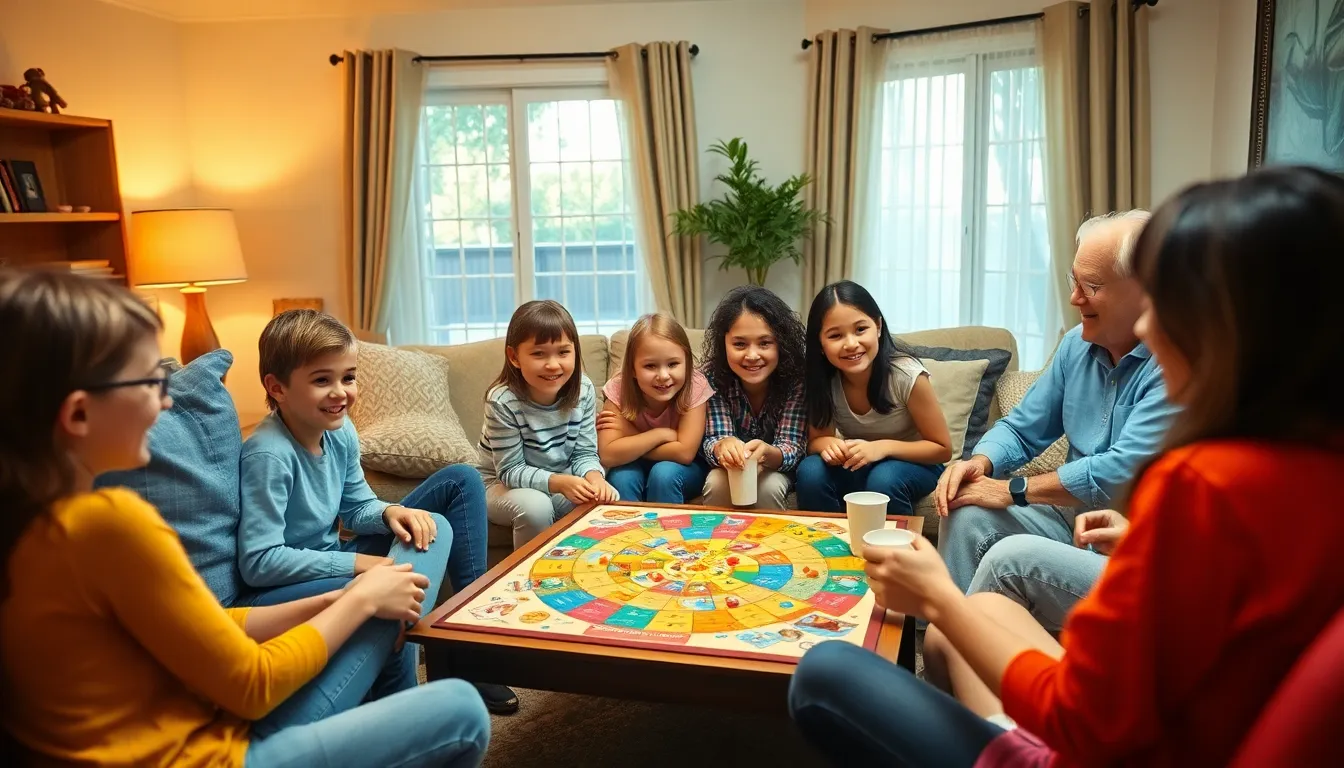Table of Contents
ToggleIn a world where family dinners often turn into a battle of who can scroll through their phones the fastest, it’s time to shake things up. Team games for families offer the perfect antidote to the digital daze, bringing everyone together for some good old-fashioned fun. Imagine laughter echoing through the house as family members unleash their competitive spirits, all while creating memories that’ll last a lifetime.
Overview of Team Games for Families
Team games for families enhance relationships and create shared experiences. Engaging in these activities fosters communication and cooperation among family members. Various types of games exist, from board games to outdoor sports, ensuring there’s something for everyone.
Cooperative board games, such as “Pandemic” or “Forbidden Island,” encourage teamwork while facing challenges. Outdoor games like capture the flag or kickball provide physical activity and promote friendly competition. These games can accommodate different age groups, ensuring all family members can participate.
Organizing family game nights strengthens bonds by setting aside time for fun. Participants can rotate game choices, giving everyone a chance to share their favorites. This creates a broader understanding of each other’s interests and preferences.
Setting up teams based on age or skill can level the playing field, ensuring enjoyment for everyone. Involving younger children in planning games also builds their confidence and problem-solving skills. Creative activities, such as scavenger hunts, stimulate curiosity while teaching collaboration.
Team games contribute to developing communication skills, critical thinking, and conflict resolution. Regularly playing these games allows families to build lasting memories. Ultimately, integrating team games into family time promotes a sense of belonging and unity.
Benefits of Playing Team Games


Team games offer numerous advantages for family interactions. These games create valuable opportunities for strengthening relationships and enhancing overall family dynamics.
Enhancing Family Bonding
Family bonding improves through shared experiences in team games. Engaging in cooperative play allows family members to connect and create lasting memories. Joint participation fosters teamwork, encouraging individuals to rely on one another. As they celebrate wins and navigate losses together, bonds grow stronger. Families can also explore new interests through different games, broadening their understanding of each other. Regularly scheduled game nights provide consistent chances for familial interaction. Shared laughter and excitement contribute to familial unity, making family time more meaningful.
Promoting Communication Skills
Communication skills flourish when families participate in team games. Players learn to express thoughts and strategies verbally. Active listening becomes essential as team members discuss game moves. Clear communication nurtures problem-solving abilities, helping family members articulate needs. Engaging in these games encourages constructive feedback, teaching the importance of respectful dialogue. Additionally, diverse game formats require adaptability, prompting families to adjust communication styles to suit various situations. These skills extend beyond the game, positively influencing interactions outside of playtime. Team games cultivate an environment where effective communication thrives, resulting in healthier family relationships.
Popular Team Games for Families
Families enjoy various team games, enhancing bonding and creating lasting memories. These games cater to different preferences, ensuring everyone has fun.
Outdoor Team Games
Capture the Flag challenges teams to strategize and work together. Players divide into two groups and aim to retrieve the opposing team’s flag while protecting their own. Kickball provides a classic playground experience, combining elements of baseball and soccer for all ages to enjoy. Another popular option, Frisbee, encourages teamwork and coordination, making it perfect for sunny days at the park. Relay races stimulate excitement and physical activity, allowing families to compete by completing tasks in succession. Outdoor games foster communication and cooperation, promoting a sense of unity among family members.
Indoor Team Games
Board games like Pandemic create collaborative experiences, where family members must work together to overcome challenges. Family trivia games stimulate friendly competition while allowing players to learn more about each other. Charades offers a funacting experience, encouraging creativity and teamwork in a light-hearted way. Pictionary blends drawing and guessing, making it engaging for family members of all ages. Additionally, card games like Uno provide opportunities for strategic thinking and interaction, keeping everyone involved. Indoor games can improve communication, allowing for connection and understanding while entertaining family members during game nights.
Tips for Organizing Family Game Nights
Organizing family game nights creates opportunities for bonding and enjoyment. Effective setup and thoughtful game selection enhance these experiences.
Setting Up the Space
Creating a welcoming environment boosts game night excitement. Arrange seating in a circle to encourage interaction. Ensure good lighting promotes visibility on game boards. Keep nearby tables clear for snacks and drinks. Consider a designated area for games that require movement, encouraging physical activity. Clutter-free spaces minimize distractions, allowing everyone to focus. A comfortable atmosphere fosters engagement and connection among family members.
Choosing the Right Games
Selecting appropriate games suits various ages and preferences. Board games like “Pandemic” engage older kids and adults, while simpler games entertain younger children. Outdoor games such as capture the flag cultivate teamwork and active play. Card games offer quick rounds for busy families. Incorporating trivia or Pictionary stimulates creativity and strategic thinking. Opt for team-oriented games that promote collaboration and communication. Variety ensures everyone enjoys playing together, maximizing fun and interaction.




